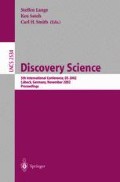Abstract
Science is one of the most creative forms of human reasoning. The recent epistemological and cognitive studies concentrate on the concept of abduction as a means to originate and refine new ideas. Traditional cognitive science accounts concerning abduction aim at illustrating discovery and creativity processes in terms of theoretical and “internal” aspects, by means of computational simulations and/or abstract cognitive models. A neglected issue, worth of a deepest investigation inside artificial intelligence, is that “discovery” is often related to a complex cognitive task involving the use and the manipulation of external world. Concrete manipulations of external world is a fundamental passage in the process of knowledge extraction and hypotheses generation: by a process of manipulative abduction it is possible to build prostheses for human minds, by interactingwith external objects and representations in a constructive way, and so by creating implicit knowledge through doing. This kind of embodied and unexpressed knowledge holds a key role in the subsequent processes of scientific comprehension and discovery. This paper aims at illustratingthe close relationship between external representations and creative processes in scientific explorations and understanding of phenomena.
Access this chapter
Tax calculation will be finalised at checkout
Purchases are for personal use only
Preview
Unable to display preview. Download preview PDF.
References
Kuhn, T.: The Structures of Scientific Revolutions. University of Chicago Press, Chicago (1962)
Magnani, L.: Abduction, Reason, and Science. Processes of Discovery and Explanation. Kluwer Academic/Plenum Publishers, New York (2001)
Magnani, L.: Epistemic mediators and model-based discovery in science. In Magnani, L., Nersessian, N., eds.: Model-Based Reasoning: Science, Technology, Values, New York, Kluwer Academic/Plenum Publishers (2002) 305–329
Flach, P., A. Kakas, e.: Abductive and Inductive Reasoning: Essays on Their Relation and Integration. Kluwer Academic Publishers, Dordrecht (2000)
Peirce, C.: Collected Papers. Harvard University Press, Cambridge, MA (1931–58) 1-6, ed. by C. Hartshorne and P. Weiss, 7-8, ed. by A.W. Burks.
Thagard, P.: Conceptual Revolutions. Princeton University Press, Princeton (1992)
Nersessian, N.: Model-based reasoningin conceptual change. In Nersessian, N., Magnani, L., Thagard, P., eds.: Model-based Reasoning in Scientific Discovery, New York, Kluwer Academic/Plenum Publishers(1999) 5–22
Polanyi, M.: The Tacit Dimension. Routledge & Kegan Paul, London (1966)
Hutchins, E.: Cognition in the Wild. MIT Press, Cambridge, MA (1995)
Nersessian, N.: How do scientists think? Capturingthe dynamics of conceptual change in science. In Giere, R., ed.: Cognitive Models of Science. Minnesota Studies in the Philosophy of Science, Minneapolis, University of Minnesota Press (1992) 3–44
Gooding, D.: Experiment and the Making of Meaning. Kluwer, Dordrecht (1990)
Magnani, L.: Thinking through doing, external representations in abductive reasoning. In: AISB 2002 Symposium on AI and Creativity in Arts and Science, London, Imperial College (2002)
Port, R., T. van Gelder, e.: Mind as Motion. Explorations in the Dynamics of Cognition. MIT Press, Cambridge, MA (1995)
Magnani, L., Piazza, M.: Morphodynamical abduction: causation by attractors dynamics of explanatory hypotheses in science (2002) Forthcomingin Foundations of Science.
Norman, D.: Things that Make Us Smart. Defending Human Attributes in the Age of the Machine. Addison-Wesley, Reading, MA (1993)
Magnani, L., Dossena, R.: Perceiving the infinite and the infinitesimal world: unveilingand optical diagrams and the construction of mathematical concepts. (2002) Forthcomingin Foundations of Science.
Author information
Authors and Affiliations
Editor information
Editors and Affiliations
Rights and permissions
Copyright information
© 2002 Springer-Verlag Berlin Heidelberg
About this paper
Cite this paper
Magnani, L., Piazza, M., Dossena, R. (2002). The Extra-Theoretical Dimension of Discovery Extracting Knowledge by Abduction. In: Lange, S., Satoh, K., Smith, C.H. (eds) Discovery Science. DS 2002. Lecture Notes in Computer Science, vol 2534. Springer, Berlin, Heidelberg. https://doi.org/10.1007/3-540-36182-0_47
Download citation
DOI: https://doi.org/10.1007/3-540-36182-0_47
Published:
Publisher Name: Springer, Berlin, Heidelberg
Print ISBN: 978-3-540-00188-1
Online ISBN: 978-3-540-36182-4
eBook Packages: Springer Book Archive

